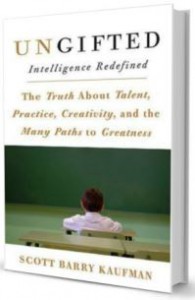Are we intelligent about developing human intelligence?
 When it comes to our understanding of human intelligence, for too long, there has been a mismatch between theory and practice. Theoretically, the two main threads running through definitions of intelligence have been (a) adaptation to the environment, and (b) the cognitive, affective, and volitional characteristics that enable that adaptation. Practically, IQ tests measure an important but limited slice of intellectual functioning in a very limited testing environment. Why such a disconnect?
When it comes to our understanding of human intelligence, for too long, there has been a mismatch between theory and practice. Theoretically, the two main threads running through definitions of intelligence have been (a) adaptation to the environment, and (b) the cognitive, affective, and volitional characteristics that enable that adaptation. Practically, IQ tests measure an important but limited slice of intellectual functioning in a very limited testing environment. Why such a disconnect?
Intelligence tests were born out of necessity. Alfred Binet was given the task of inventing a test that would distinguish fast learners from slow learners in a school environment. From the very first test of intelligence, we’ve been operating in an individual differences paradigm, and have been stuck in that paradigm ever since. Attempts to go beyond IQ seem to just add on more individual difference variables, and slap the label “intelligence” on them. This creates more tests, and more ways to compare one person to another on whatever tests of intelligence the psychologist has created. But here’s the thing: there’s no objective reason why society still needs to operate in this paradigm.
While standardized tests can certainly be useful for scientifically investigating the mind and brain, and can greatly inform educational interventions, there’s no reason why educators or anyone else for that matter needs to compare the intelligence of one person to another based on a single dimension of human variation. Truth is, general intelligence—the largest source of cognitive variation ever discovered in humans—is merely a description of patterns of variation found between people; it doesn’t actually exist within any individual.
Developmental psychologists are developing exciting new techniques to study variation within the person. Instead of selecting a few fixed time points and range of cognitive skills, and aggregating the results across subjects, the new person-specific paradigm focuses on a single person, selects a range of time points, and considers the trajectory of a dynamic system of cognitive, emotional, and personality processes as they unfold over time. The results from the traditional individual differences paradigm— where we compare people to each other—do not apply at the person-specific level.
I believe this has major implications for our understanding of human intelligence. For over 100 years, the field of intelligence has mostly concerned itself with intellectual functions that show the largest variation between humans, while less attention has been given to functions that display minimal difference between people. But I believe shifting our level of analysis to the person presents enormous opportunities. It allows us to more clearly see, and appreciate, the richness of human intelligence. As Steven Pinker notes, “Humans everywhere on the planet see, talk, and think about objects and people in the same basic way. The difference between Einstein and a high school dropout is trivial compared to the difference between the high school dropout and the best robot in existence, or between the high school dropout and a chimpanzee.”
Once we look at how individuals actually attain their personal goals in the real world, many more aspects of human intelligence become visible than when we focused only on the characteristics that most strongly differentiate people. Virtually every human being on this planet has the same basic needs for competence, autonomy, relatedness, belonging, and uniqueness, even if we differ in the balance of those needs. We all have the capacity to cultivate a growth mindset, learn how to practice deliberately, or flex our self-regulation muscles. We’ve all been endowed with powerful “structure mapping” attentional mechanisms that allow us to soak up fundamental knowledge about spatial relations, numbers, probability, logic, language, physical objects, living things, artifacts, music, aesthetics, and the beliefs and desires of other minds, even if we differ in what captivates our attention. Virtually everyone draws on a robust implicit learning system to soak up the probabilistic rule structure of the world and can use powerful long-term working memory mechanisms to acquire a deep, rich expertise base in some domain of human knowledge.
Some researchers might emphasize that these capabilities are evolutionarily older than fluid reasoning or working memory. But keep in mind that our complex minds didn’t appear overnight. For most of our human evolution, new structures were gradually built on top of older structures. The complexity of the human brain is the result of millions of years of trial- and-error in a variety of different environments. Minds that were adaptive for survival and reproduction in particular niches were maintained. Drafts that weren’t adaptive were gradually put into the waste bin. You can think of our minds as a layer cake. Each layer is important, and has contributed significantly to who we are as a species, and what we are capable of. Just because a mechanism of the mind is evolutionarily older does not make it any less important for adaptive functioning.
It is my belief that it’s time for a new definition of human intelligence that takes all of these aspects of the human mind into account. One that emphasizes the value of an individual’s personal journey. That extends the time course of intelligence from a two-hour testing session of decontextualized problem solving to a lifetime of deeply meaningful engagement. That arms students with the mindsets and strategies they need to realize their personal goals, without limiting or pre-judging their chances of  success at any stage in the process. That shifts the focus from doing everything right to a lifelong learning process where bumps and detours are par for the course. From a fixed mindset to a growth mindset. From product to process.
success at any stage in the process. That shifts the focus from doing everything right to a lifelong learning process where bumps and detours are par for the course. From a fixed mindset to a growth mindset. From product to process.
It’s time for The Theory of Personal Intelligence.
 – This is an adapted excerpt from Ungifted: Intelligence Redefined — The Truth About Talent, Practice, Creativity, and the Many Paths to Greatness, by Scott Barry Kaufman (June 2013; 424 pages). Available from Basic Books, a member of the Perseus Books Group. Copyright © 2013.
– This is an adapted excerpt from Ungifted: Intelligence Redefined — The Truth About Talent, Practice, Creativity, and the Many Paths to Greatness, by Scott Barry Kaufman (June 2013; 424 pages). Available from Basic Books, a member of the Perseus Books Group. Copyright © 2013.


